| Listing 1 - 10 of 57 | << page >> |
Sort by
|
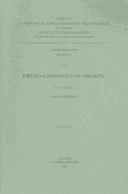
ISBN: 9042910801 2877236056 9042910917 2877236064 9789042910911 9782877236065 9789042910805 9782877236058 Year: 2002 Volume: 232-233 592-593 Publisher: Louvain: Peeters,
Abstract | Keywords | Export | Availability | Bookmark
 Loading...
Loading...Choose an application
- Reference Manager
- EndNote
- RefWorks (Direct export to RefWorks)
Virginity --- Religious aspects --- Christianity --- 276 =923 --- -Sexual abstinence --- Defloration --- First sexual experiences --- Syrische patrologie --- -Christianity --- Maagdelijkheid. --- Christianity. --- -Syrische patrologie --- Sexual abstinence --- Religious aspects&delete& --- Virginity - Religious aspects - Christianity
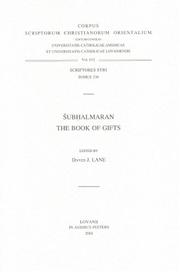
ISBN: 9042915188 2877238180 9042915196 2877238199 9789042915183 9789042915190 Year: 2004 Volume: 612-613 236-237 Publisher: Lovanii Peeters
Abstract | Keywords | Export | Availability | Bookmark
 Loading...
Loading...Choose an application
- Reference Manager
- EndNote
- RefWorks (Direct export to RefWorks)
Asceticism --- Academic collection --- 276 =923 --- Syrische patrologie --- Asceticism - Early works to 1800
Book
ISBN: 9781607240495 1607240491 1463216092 Year: 2010 Publisher: Piscataway Gorgias Press
Abstract | Keywords | Export | Availability | Bookmark
 Loading...
Loading...Choose an application
- Reference Manager
- EndNote
- RefWorks (Direct export to RefWorks)
A collection of studies on the Syriac sixth-century writer Jacob of Sarug by a team of international scholars, including Susan Ashbrook Harvey, Sebastian P. Brock, Sharbil Iskandar Bcheiry, Khalid Dinno, Sidney Griffith, Mary Hansbury, Amir Harrak, George A. Kiraz, Edward Mathews, Aho Shemunkasho, and Lucas Van Rompay. The papers were presented on the occasion of the 50-year celebration of the establishment of St. Mark’s Syrian Orthodox Cathedral in Teaneck, New Jersey.
276 =923 JACOBUS SARUGENSIS --- Syrische patrologie--JACOBUS SARUGENSIS --- Jacob --- Conferences - Meetings --- Jacob,
Book
ISBN: 9789004527546 9004527540 9789004527553 9004527559 Year: 2023 Publisher: Leiden: Brill,
Abstract | Keywords | Export | Availability | Bookmark
 Loading...
Loading...Choose an application
- Reference Manager
- EndNote
- RefWorks (Direct export to RefWorks)
From the 6th century onwards, Syriac patristic florilegia - collections of Greek patristic excerpts in Syriac translation - progressively became a prominent form through which Syriac and Arab Christians shaped their knowledge of theology. In these collections, early Greek Christian literature underwent a substantial process of selection and re-organization. The papers collected in this volume study Syriac florilegia in their own right, as cultural products possessing their own specific textuality, and outline a phenomenology of Syriac patristic florilegia by mapping their diffusion and relevance in time and space, from the 6th to the 17th century, from the Roman Empire to China.
Christian literature, Syriac --- Syriac literature --- Manuscripts, Syriac --- 276 =923 --- 276 =923 Patrologie syrienne --- 276 =923 Syrische patrologie --- Patrologie syrienne --- Syrische patrologie --- Syriac manuscripts --- Syriac language --- Syriac Christian literature --- History and criticism
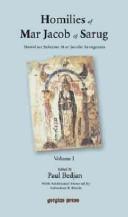
ISBN: 1593333277 9781593333270 1593333285 9781593333287 1593333293 9781593333294 1593333307 9781593333300 1593333315 9781593333317 1593333323 9781593333324 1593333331 9781593333331 Year: 2006 Publisher: Piscataway Gorgias
Abstract | Keywords | Export | Availability | Bookmark
 Loading...
Loading...Choose an application
- Reference Manager
- EndNote
- RefWorks (Direct export to RefWorks)
Book
ISSN: 07501978 ISBN: 9782204117555 2204117552 9782204126380 2204126381 Year: 2017 Volume: 587, 590 Publisher: Paris: Cerf,
Abstract | Keywords | Export | Availability | Bookmark
 Loading...
Loading...Choose an application
- Reference Manager
- EndNote
- RefWorks (Direct export to RefWorks)
Dans l’oeuvre conservée d’Éphrem de Nisibe (306-373), les recueils d’hymnes ici réunis, de par leur nature polémique, adoptent un ton virulent ou polémique qui tranche singulièrement avec les hymnes à caractère liturgique, généralement mieux connues. Il s’agit pour Éphrem, dans les cinquante-six Hymnes contre les hérésies, de combattre les « doctrines erronées » de trois hérésiarques : Marcion, qui opposait le Démiurge mauvais de l’Ancien Testament au Dieu bon du Nouveau, Bardesane, qu’Éphrem accusait de croire au fatalisme astral, et Mani, le fameux tenant du dualisme ontologique entre le bien et le mal. Quant aux Hymnes contre Julien, qui complètent le prochain tome, le Syrien y polémique contre l’empereur « apostat » dont le règne, bien que très court (361-363), avait constitué une menace pour le jeune empire chrétien initié par Constantin. Au-delà de ces controverses, parmi les thématiques théologiques et spirituelles qu’il développe, le Docteur syrien insiste sur la liberté de l’être humain et sur la valeur positive du corps, en évoquant l’existence chrétienne comme « chemin de vie » et en se montrant, une fois de plus, lecteur virtuose de l’Écriture sainte. Le tome I contient les 29 premières hymnes Contre les hérésies, avec en regard de la traduction française le texte syriaque dans une composition fidèle à sa forme poétique. Le tome II contient les Hymnes contre les hérésies XXX à LVI et, avec une hymne liminale, les Hymnes contre Julien. En regard de la traduction française, le texte syriaque est composé de manière fidèle à sa forme poétique.
Apologetics --- Apologetics. --- Hymns, Syriac. --- Ephraem, --- 276 =923 EPHRAEM SYRUS --- 276 =923 EPHRAEM SYRUS Patrologie syrienne--EPHRAEM SYRUS --- 276 =923 EPHRAEM SYRUS Syrische patrologie--EPHRAEM SYRUS --- Patrologie syrienne--EPHRAEM SYRUS --- Syrische patrologie--EPHRAEM SYRUS --- Hymns, Syriac --- Christian heresies --- Christian heresies. --- Syrische patrologie
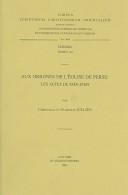
ISBN: 904290593X 9042905948 9789042905931 9789042905948 Year: 1998 Volume: 23-24 572-573 Publisher: Lovanii: Peeters,
Abstract | Keywords | Export | Availability | Bookmark
 Loading...
Loading...Choose an application
- Reference Manager
- EndNote
- RefWorks (Direct export to RefWorks)
222.2 --- 276 =923 EPHRAEM SYRUS --- Academic collection --- Genesis --- Syrische patrologie--EPHRAEM SYRUS --- Antigo testamento. --- Arménien (Langue) --- Bíblia (comentários). --- Filosofia cristã. --- Genesis (bijbelboek). --- Bible. --- Commentaires --- Oude Testament

ISBN: 2204067342 9782204067348 Year: 2003 Volume: 470 Publisher: Paris: Cerf,
Abstract | Keywords | Export | Availability | Bookmark
 Loading...
Loading...Choose an application
- Reference Manager
- EndNote
- RefWorks (Direct export to RefWorks)
Classical Greek literature --- Patrology --- Aristides of Athens --- Apologetics --- Apologétique --- Early works to 1800 --- Ouvrages avant 1800 --- Aristides, --- #GGSB: Syrische Patrologie (tekst) --- #GGSB: Griekse patrologie (tekst) --- 261.2 --- #GOSA:II.P.Alg.O --- De Kerk en het klassieke heidendom --- 261.2 De Kerk en het klassieke heidendom --- Apologétique --- Griekse patrologie (tekst) --- Syrische Patrologie (tekst) --- Apologetics - Early works to 1800
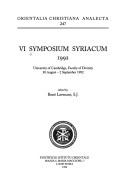
ISSN: 15907449 ISBN: 8872103053 9788872103050 Year: 1994 Volume: 247 Publisher: Roma: Pontificio istituto orientale,
Abstract | Keywords | Export | Availability | Bookmark
 Loading...
Loading...Choose an application
- Reference Manager
- EndNote
- RefWorks (Direct export to RefWorks)
Syrian churches --- Syriac language --- History --- Congresses --- Bible --- Criticism, interpretation, etc. --- 276 =923 <063> --- -Syriac literature --- -Syrian Church --- Eastern churches --- Middle Eastern literature --- Semitic languages, Northwest --- Aramaic language --- Syrische patrologie--Congressen --- -Congresses --- Literatur. --- Syrisch. --- Syrische Kirche. --- -Syrische patrologie--Congressen --- Syriac literature --- Syrian Church --- History&delete& --- Congresses. --- Biblia --- Syrian churches - History - Congresses --- Syriac language - Congresses
Book
ISBN: 9781463206635 1463206631 1463237375 Year: 2017 Volume: 2 Publisher: Piscataway, NJ: Gorgias Press,
Abstract | Keywords | Export | Availability | Bookmark
 Loading...
Loading...Choose an application
- Reference Manager
- EndNote
- RefWorks (Direct export to RefWorks)
The Chronicle of Zuqnin is a universal history beginning with the Creation according to the biblical account and ending with the time of the Chronicler, the years 775-776 AD. The author is most probably Joshua the Stylite, a contemporary of the Caliphs al-Mansur and al-Mahdi, who lived in the monastery of Zuqnin that was located near Amid, the Diar-Bakr of modern Turkey. Parts I and II contain compiled sources some of which survived only in this Chronicle. Sources include the Bible, Cave of Treasures, the Sleepers of Ephesus, Eusebius of Caesarea, Socrates, and the short Chronicle called Pseudo-Joshua the Stylite that deals with Sassanian-Byzantine warfare at the begging of the 6th century. Parts III and IV cover the years 488 and 775 AD. In this volume, Parts I and II, including the author's dedicatory letter, are now published in an updated edition of the Syriac text and the first English translation.
History, Ancient --- Syriac language --- Texts. --- Pseudo-Dionysius, --- Middle East --- Byzantine Empire --- History --- Church history --- History, Ancient. --- 276 =923 --- 276 =923 Patrologie syrienne --- 276 =923 Syrische patrologie --- Patrologie syrienne --- Syrische patrologie --- History, Ancient - Sources. --- Syriac language - Texts. --- Pseudo-Dionysius, - of Tel-Maḥrē, - active 8th century. - Makhtevanuta --- Middle East - History - To 622 - Sources. --- Byzantine Empire - History - 527-1081 - Sources. --- Middle East - Church history - Sources.
| Listing 1 - 10 of 57 | << page >> |
Sort by
|

 Search
Search Feedback
Feedback About UniCat
About UniCat  Help
Help News
News